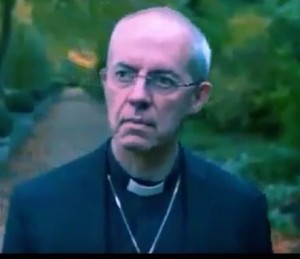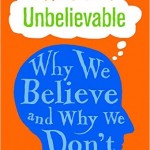The three major cinema chains that control 80% of UK cinemas recently rejected an advert that consists of a 60 second montage of the Lord’s Prayer, spoken by a variety of different people in different situations and prepared by the Church of England (see news report). The advert was set to go out before screenings of the new Star Wars film, and the church saw it as a way of reaching the wide audiences that would come to see this film before Christmas. The reason given by the cinema companies is that they do not accept any political or religious advertising, for such advertising might be offensive to some customers. The 60 second clip, however, has a simple message “Prayer is for everybody”, and (beyond what may be implied by that statement) does not advertise any particular religious view. You can see the advert here.
I can hear the Christians shouting “What’s offensive about this?” and the secularists shouting “Quite right too. We don’t want religious propaganda on our cinema screens”. But let’s try to unpick the likely assumptions of both sides a little. As usual, absolutisations on both sides tend to obscure the issues.
The Christians may find the Lord’s Prayer so familiar and culturally routine that they may not notice how absolute its language is. It asserts the existence of God in heaven. It embeds the metaphor of God as father that helps to entrench patriarchy. It asks God to exert his power and will over the earth in a way that could leave us passive or with a sense of false certainty about everything being taken care of for us. It asks God to ‘deliver us from evil’ as though to obscure all the tsunamis, cancer victims and murders in his name that he seems to have done nothing about, despite his supposed omnipotence. It also completes the fantasy by affirming belief in the kingdom, often interpreted as an ideal state in the future where God will have fixed everything. Although there are some lines in the prayer, such as those urging us to forgive others, that seem to have a helpful integrative orientation, the Lord’s Prayer taken just as a set of words is not really that inoffensive. It is indeed religious propaganda for unhelpful absolute beliefs that – at least as they are most commonly understood – will not actually help anyone to overcome conflict or address conditions better. On the contrary they may make it worse.
But then, watch the video again, this time focusing not on the words but on the people. The atmosphere of the whole carefully constructed video is extremely positive and reassuring. All the different people, in their diverse situations, are mindful and focused, taking a moment of reflectiveness in the middle of their day. That moment of reflectiveness is powerful. But then imagine all the same scenes with slightly different words. Would the effect be very different? Perhaps for some people the reassurance of the time-worn words, apparently almost meaningless but vaguely comforting, would be lost. But much of the power of that moment of recollection would remain. So most of it is not intrinsically dependent on the Lord’s Prayer itself.
The movement between diverse people all similarly focused also creates a strong sense of human solidarity that I find inspiring, even uplifting. Again though, it is not the words that intrinsically create that sense of solidarity. Religion has developed in such a way that layers of ritual affirming human solidarity are overlaid on a core of beliefs that tend to undermine that solidarity. To see how they might undermine it too, imagine the reactions that would be provoked by singing the Lord’s Prayer in a mosque, or at a lecture given by Richard Dawkins.
So, to understand what the secularists may also be missing, think about the disjunction between the absolute beliefs affirmed by the Lord’s Prayer and the positive meaning of the prayer for millions of Christians, as it is depicted on the video. Those Christians will probably be bewildered if you tell them that their prayer of peace is also productive of conflict. That’s really not what it means to them. Nevertheless, we can all integrate our interpretations of the meaning of the Lord’s Prayer by acknowledging the wide range of things it can mean, and that those meanings depend on the various bodies of the people who experience it, rather than the prayer having a “real” meaning (whether that meaning is good or bad) independent of those people and their bodies. This mistake in what we take meaning to be seems to be at the heart of the mutual incomprehension that arises on topics like this.
Another thing that secularists often neglect to recognise is that absolutisation is not at all the sole preserve of religion. Let’s go back to the Star Wars showing in the cinema. Is the Lord’s Prayer advert uniquely ‘offensive’ because it contains absolutisations (as well as conveying an experience of human reflectiveness and solidarity)? Well, if it’s offensive, it’s certainly not uniquely offensive. The Lord’s Prayer advert, if it had been shown, would probably have been preceded and followed by other adverts that encouraged people to absolutise beliefs such as that they would be uniquely attractive is they use a particular perfume, or absolutely powerful if they drive a particular car. Belief in the value of hedonism, that value comes only from pleasure, could also be seen as reinforced by nearly every commercial advert. But these kinds of consumerist absolutisations generally pass without critical comment.
Then there’s the film itself that would follow. Not being a Star Wars devotee, I’m not familiar with the details of the religious elements of Star Wars, but I gather that they involve a certain amount of cod Zen mixed in with the providentialism of ‘May the Force be with you’. Probably a good deal vaguer than the Lord’s Prayer, but it doesn’t sound as though it’s free of absolutisations. Those absolutisations will be far more forcefully propagandised by a lengthy film with a narrative, characters etc than they would have been by the Lord’s Prayer advert. Indeed it seems likely that by the end of the film 98% of the audience would have completely forgotten about the Lord’s Prayer, swept away by the power of fantasy. Again, the meaning of this for the people who watch it is probably far more important than the effect it will actually have on their beliefs, but that doesn’t mean that no dubious beliefs are being promoted.
So, were the cinemas right to refuse to screen the Lord’s Prayer advert on the grounds that some people might find it offensive? No. I disagree with the absolutisations in the Lord’s Prayer, but let’s also understand the role of these in context. If we start trying to control the expression of absolutisations in the public sphere in any way, let’s at least try to do so consistently, rather than picking on religious ones as offensive when commercial ones are apparently not so. In its context, too, the Lord’s Prayer advert would have functioned mainly as a moment of calm, reflectiveness and solidarity in the midst of a storm of over-stimulation, hedonism, violent combat and archetypal idealisation. Let’s have more of those moments of calm and solidarity. If they could come without absolutisations, that would be preferable, but let’s not make the perfect the enemy of the good.



